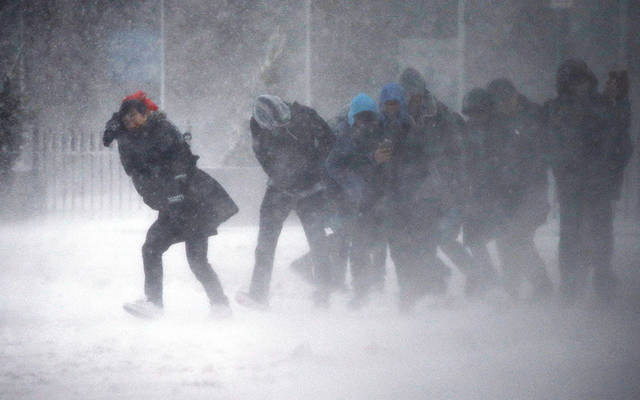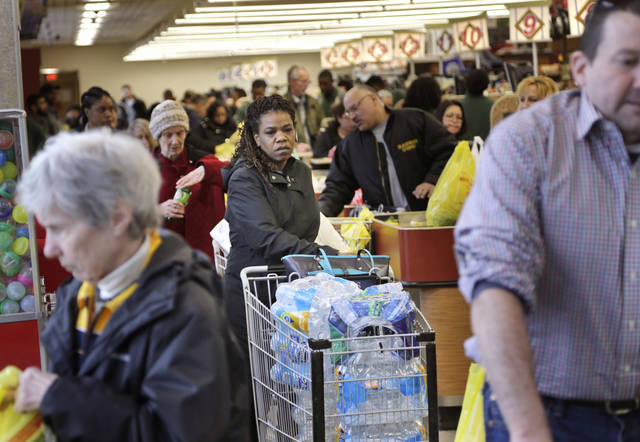Sloppy late-season storm clobbers Northeast

ASSOCIATED PRESS
People struggled to walk in the blowing snow during a winter storm, today, in Boston.

ASSOCIATED PRESS
Two men played golf with a tennis ball as a snowstorm swept through Times Square, today, in New York.

ASSOCIATED PRESS
A grocery store was filled with shoppers stocking up on food and other supplies in Paramus, N.J. Monday.



NEW YORK >> A sloppy, blustery late-season storm lashed the Northeast with sleet and more than a foot of snow in places today, paralyzing much of the Washington-to-Boston corridor after a remarkably mild February had lulled people into thinking the worst of winter was over.
The powerful nor’easter grounded nearly 6,000 flights, knocked out power to almost a quarter-million customers from Virginia northward, closed schools in cities big and small and prompted dire warnings to stay off the roads. Amtrak suspended service and the post office halted mail delivery.
As the morning wore on, the storm track shifted slightly and snow switched to sleet in Philadelphia and New York, prompting forecasters to lift blizzard warnings for the two big cities and cut their prediction of a foot or more of snow by over half.
But Boston was still in the crosshairs, with up to a foot expected in the metropolitan area and gusts up to 75 mph forecast along the Massachusetts coast. And inland areas up and down the Northeast got clobbered.
Harrisburg, Pennsylvania, received at least a foot of snow, and Wantage, New Jersey, got at least 17 inches. New York’s Hudson Valley had up to 20 inches by midafternoon.
“The winters seem to be upside down now. January and February are nice and then March and April seem to be more wintry than they were in the past,” said Bob Clifford, who ventured out on an early morning grocery run for his family in Altamont, near Albany, New York.
Don't miss out on what's happening!
Stay in touch with breaking news, as it happens, conveniently in your email inbox. It's FREE!
His advice: “Just hide inside. Hibernate.”
A 16-year-old girl was killed in New Hampshire after she lost control of her car on a snowy road and hit a tree. But many other people were home, and stayed there, when the storm rolled in Monday night and this morning.
“Good day to make brownies … and or read a book,” said Gov. Dannel P. Malloy of Connecticut, which was expecting up to 2 feet of snow in some areas.
The above-ground portions of the New York subway system were shut down, and the flight cancellations included nearly 3,300 in the New York City area alone. Hundreds of passengers were stranded at airports.
Laura and Matthew Balderstone of West Yorkshire, England, intended to spend their honeymoon in Florida but found themselves stuck at the Newark, New Jersey, airport and couldn’t find a hotel room.
“It’s better safe than sorry, especially flying. I suppose it’s a shame that we can’t get another way around this. It’s just the way it is, unfortunately,” Matthew Balderstone said.
In the nation’s capital, the federal government announced a three-hour delayed arrival for non-emergency employees, with an option to take the day off or telecommute.
The nor’easter came a week after the region saw temperatures climb into the 60s, and less than a week before the official start of spring.
A few days ago, workers on Washington’s National Mall were making plan to turn on the fountains.
“Obviously all that has to come to an abrupt stop until we get all the snow cleared,” said Jeff Gowen, the acting facility manager for the National Mall and Memorial Parks. “The cherry blossoms, they’re right on the cusp of going into bloom here. I had a feeling this was going to happen.”
Kelly Erskine, a 28-year-old coffee shop manager from Whitman, Massachusetts, about 25 miles south of Boston, made it almost all the way through the winter without a shovel. She went to Walmart this morning to get one.
“I live in an apartment complex and they usually take care of the shoveling, but they sent a letter to us and said, ‘Expect a lot of snow.’ I knew from the letter that I’d have to go out and buy a shovel,” she said.
In Narragansett, Rhode Island, high winds knocked down a state-owned wind turbine. In New York City, two homes under construction collapsed near the waterfront in Far Rockaway. No injuries were reported.
And two ponies broke out of their stables and roamed the snowy streets of Staten Island until an off-duty police officer wrangled them with straps normally used to tow cars and tied them to a lamppost. They were taken back to the stables.
“We want to thank our cowboy officer,” Mayor Bill de Blasio said.
The storm coincided with New Hampshire’s traditional Town Meeting Day, when voters in more than 100 communities elect boards of selectman, library trustees and a host of other local positions, and in some locations, set their annual budgets.
Some towns postponed their elections because of the snow. But in Hopkinton, a steady stream of voters braved the blustery conditions to make it to the polls.
“You know, they’re hardy New Englanders, and they’re coming to vote,” said Debbie Norris, a candidate for the Hopkinton Budget Committee.
At Rosie’s Liquor & Deli in Abington, about 20 miles south of Boston, business was steady as customers with the day off from work came in to buy something to get through the storm, including a woman who bought a bottle of champagne to bring to a friend’s house.
“Nobody’s working, so everybody’s drinking,” said store clerk Steve Correia.
Schools in New York, Philadelphia, Boston and elsewhere closed.
Pennsylvania Gov. Tom Wolf said about 700 National Guard members would be deployed along with more than 2,000 snowplows to keep up with the storm.
The snow threat led college basketball teams to alter their March Madness travel plans. Villanova, top overall seed in the men’s NCAA Tournament, left Philadelphia on Monday afternoon for Buffalo, New York, to get ahead of the storm.
But teams in the men’s and women’s tournaments rely on chartered flights, so any backlog at commercial airlines shouldn’t be a problem.
Associated Press writers Denise Lavoie in Whitman and Abington, Massachusetts; Bruce Shipkowski in Trenton, New Jersey; John Kekis in Albany, New York; Michelle R. Smith and Jennifer McDermott in Providence, Rhode Island; Dave Collins in Hartford, Connecticut; Shawn Marsh in Manasquan, New Jersey; Kristen DeGroot in Philadelphia; Holly Ramer in Hopkinton, New Hampshire; Ted Shaffrey in Newark, New Jersey; Ben Nuckols in Washington; and Michael Rubinkam in northeastern Pennsylvania contributed to this report.

 Holy Week & Easter in Aiea || Free Events for All at OSHi! ️️
Holy Week & Easter in Aiea || Free Events for All at OSHi! ️️

